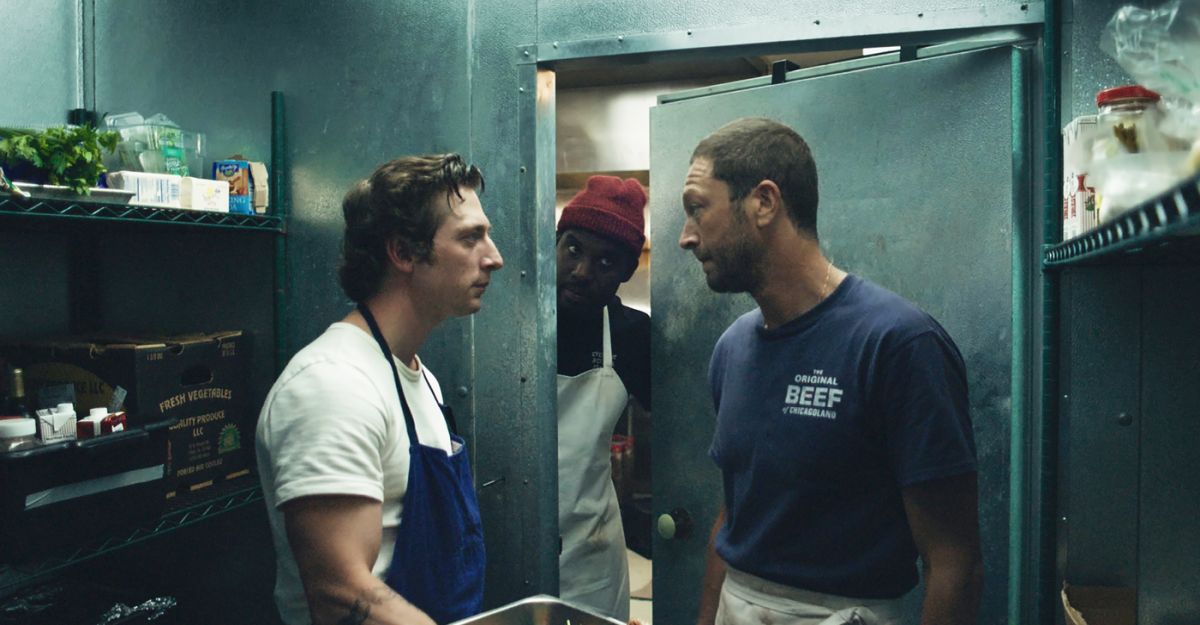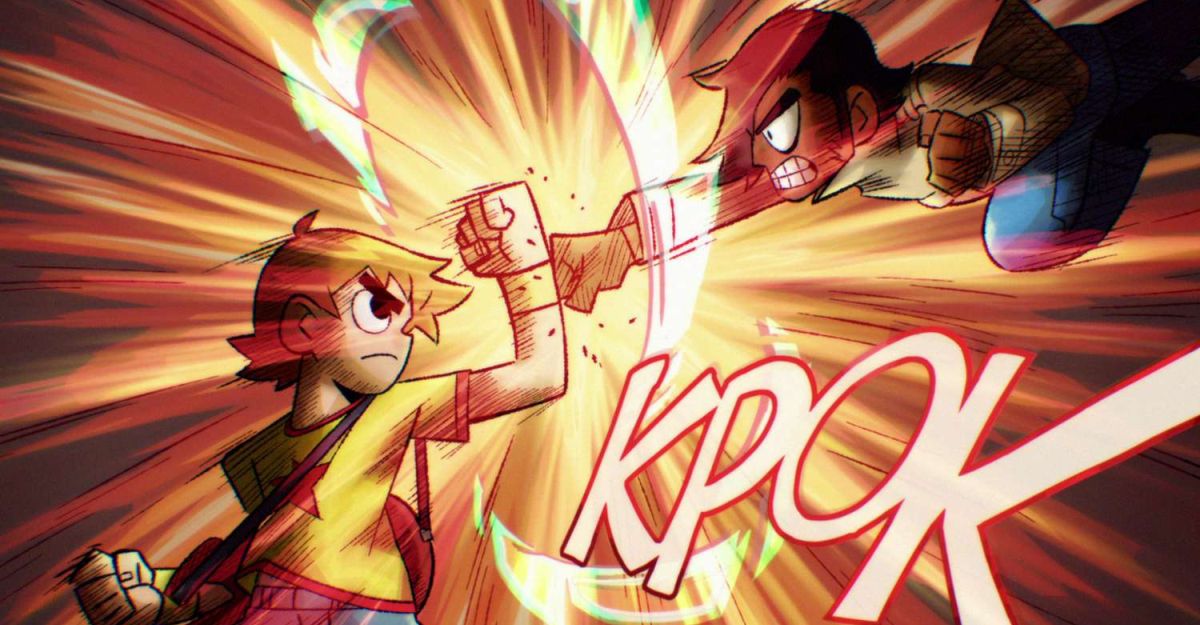“Gastronomy is the science of pain. Professional cooks belong to a secret society whose ancient rituals derive from the principles of stoicism in the face of humiliation, injury, fatigue, and the threat of illness.” Anthony Bourdain wrote this in 1999 in a New Yorker essay which would jumpstart his career as one of the most recognised celebrity chefs in the world. Bourdain embodied the “masculine” chef: stoic, expert, and weathered through abuse. This ideal is present throughout pop cultural understandings of the commercial kitchen, represented on television series, movies, and reality tv. Most recently they’ve found themselves demonstrated in Christopher Storer’s The Bear.
The Bear revolves around a struggling sandwich shop in Chicago. We follow Michelin starred chef Carmy, who has inherited the shop from his recently deceased brother (later revealed to have died by suicide). The Bear doesn’t shy away from the realities of the restaurant business, nor the violence of the kitchen. Within its first season, chefs, male and female, regularly trade verbal abuse, dismiss injuries from burns to stab wounds, and chide, or disguise, any signs of sympathy or affection. Chefs and academics have described how the environment depicted is precise — although whether or not this precision valorises these elements as opposed to merely representing them is a matter for debate.
Commercial kitchens are often portrayed this way in the media. Gordon Ramsey’s Hell’s Kitchen is completing its twenty-second season, making it the longest running cooking reality television show. Ramsey’s career has thrived under his public persona of the domineering and abusive head chef, littering the internet with endless memes. In the show, Ramsey expects perfection from his chefs, deriding any mistakes or imprecision. Ellen T Meiser and Penn Pantumsinchai contend that shows like Hell’s Kitchen are the first experience most individuals will have with “the concept of kitchen work” and that, while they do not create the violent behaviours present in the commercial kitchen, they often serve as a justification that the behaviour is not only acceptable “but a necessary tool of cohesion and functionality in the workplace.”
The way abuse is used to maintain order within kitchen is in part tied to the masculine nature of both work and specifically manual labour. Raewyn Connell has written extensively on the intersection of work, power, and masculinities. She notes in particular that “economic and organisation structure enter into the making of masculinity.” The work performed in a commercial kitchen is the same that is and has been performed in domestic homes. While both are a form of care work, commercial cooking is distanced from femininity through its status as “skilled work” and wage labour, reinforced through professional titles such as chef. With the masculine comes an exacerbated culture of violence, abuse, and risk to the workers. Connell argues that this happens not because manual labour itself is necessarily destructive “but because it is done in a destructive way under economic pressure and management control.”
Connell’s work in her book Masculinities reframes the idea of masculinity from a binary category tied to men’s bodies and in opposition to femininity, to a complex hierarchy of multiple masculinities. These are groupings of identities, social mores and behaviours that position men, and women, against the hegemonic ideal —a masculinity composed of the expected behaviours, attributes, and social mores within a given place, time, or community.
The hegemonic masculinity and other masculinities are not a fixed identity and are constantly being reconstructed according to gender dynamic of any given social setting. For example, what is considered masculine within gamer culture differs from that on a football field. This interplay of dominance and subordination creates a culture of stigma. Men who fail to meet these ideals may use violence to assert or maintain their dominance over “subordinate masculinities” — those who conform less to those ideals. It’s this struggle for dominance we see at play in The Bear.
Early in the first season, Carmy decides to implement the French brigade system to create order and structure to the restaurant. This idea is met with resistance: Sydney, the only other chef with formal culinary training, dislikes the “toxic hierarchical shitshow” it would introduce, while chef Ebraheim, a refugee from the Somali civil war, simply states: “I was in a brigade once. Many people died.”
The brigade system was created by Georges-Auguste Escoffier, who modelled it after his time as a chef for the French military. As Robin Burrow, Rebecca Scott, and David Courpasson argue, military orthodoxy parallels and complements the culture of commercial kitchens, where abuse, scars and stress are seen as not only an occupational hazard but a requirement, and are worn as badge of membership to the industry. The practice of showing scars and telling their story can be seen in The Bear. The brigade system creates a strict — some may say autocratic — hierarchy where those beneath must obey the commands of their superiors. This is embodied by the call “yes chef.” Chef and food writer Jen Agg describes this environment:
But right next to that is the assumption that you are a “team player,” a “culture fit.” That might mean when your boss makes a rape joke, you feel obligated to laugh along. Maybe when the chef mutters “nice ass” as the pastry assistant walks by, you fall in line and treat her the same way. With career advancement on the line, mirroring superiors in the kitchen is nearly a given.
This system reproduces the masculine culture of the kitchen, pressuring those who don’t fit to adapt, or suffer. Jenn Agg is far from the only woman who has adopted the masculinity of the kitchen to become one of the boys. In his memoir Kitchen Confidential, Bourdain describes a female chef bending a male co-worker over and miming an act of sodomy in response to being pinched on the bum. Nilsson observes this behaviour within Hell’s Kitchen, analysing the gendered dynamic to Ramsey’s insults: “for the female cooks the negative judgements have to do with their being too feminine” while the men are subjected to criticism about “their not being manly enough.” She notes that “men are expected to conjure manliness up out of their inner being, while it is something the women have to learn.” This culture is instilled through Ramsey’s own construction of masculinity, or manliness, which he views as a requirement to survive the kitchen, while “femininity is used to symbolize the opposite.” This pressures women to adopt masculine qualities to gain respect and move upward in the kitchen.
Within The Bear, this dynamic is shown through different degrees by Tina, a long-time chef, and Sydney, an early-career one. Throughout the show’s first season, Tina is combative and withholding, and sabotages not only herself but also Sydney. She refuses help and anticipates abuse from her now-superior younger colleague. This demonstrates the successful weathering of her feminine qualities to meet the masculine requirements of the workplace. We can see that the workplace itself has influenced Tina’s performance of gender, as she becomes more supportive and nurturing as the kitchen culture shifts over the first season, and into the second.
The opposite can be said of Sydney, who arrives at The Beef disaffected by the masculine culture of the kitchen. Although demonstrating a snobbery probably connected to her formal training, she attempts to be calm, collected, and supportive in her leadership style as sous chef. This approach soon starts to wane, however. Richie undercuts her authority with sexism, but also a rejection of her formal training and professional background. In later episodes, Sydney’s leader style shifts and she becomes more abusive, and less collegial.
Between the first and second season, The Bear’s depiction of workplace abuse shifts away from the physical and verbal, becoming more insidious. As the shows transition between The Beef, a local sandwich shop, and The Bear, a fine-dining establishment, the restaurant’s culture shows the interplay of “professionalism” within masculinity and hierarchy.
Structures of hierarchy and abuse are not just the result of economic and organisational pressures but are constructed to maintain the masculinity of the industry. Risk, violence, and professionalism maintain the commercial kitchen’s status as masculine, while distancing it from the feminine domestic kitchen.
Analysing a male celebrity on the reality television show, Dancing on Ice, Robert Payne notes how skill and “the trope of mastery” allows men to legitimise their masculinity within a feminised industry. By performing difficult tricks, and engaging in risky behaviour, the male celebrity was able to distance himself from the “feminine gender attributes” associated with the sport. These same practices are being performed in kitchens, from the risk-taking behaviour, showing of scars and adherence to professionalism within the kitchen setting. These allow the domestic to become masculine; however, masculinity’s relationship with abuse within commercial kitchens does not negate the traditionally feminine domestic kitchen’s capacity for violence. We see this within The Bear through Donna, the matriarch of the Berzatto family, whose kitchen parallels The Beef — the mess, the chaos, the shouting. We understand through our time with Donna that Carmy and Michael’s traumas are just as much a product of their time within the domestic kitchen as within its commercial counterpart.
In the second season, Richie’s internship offers a (rosier) representation of fine-dining, the fruits of organisation, skill and experience. Within this highly-awarded kitchen we don’t see risky behaviour (although inklings of latent abuse leak through via the infamous “smudge” incident). Richie’s transformation during his placement shows a more subtle violence within the industry. While finding purpose during an unpaid internship, Richie begins reading Unreasonable Hospitality — a book whose doctrine puts the enjoyment of often wealthy, patrons above all things. Adam Reiner critiques this “hospitality evangelism” as a “quest for purity [that] often leads to unhealthy competition among the staff, much the same way it does in educational environments populated by overachievers.” This is all summed up in the mantra “Every Second Counts,” which bastardises a sentiment of making the most of life by applying it wage-labour. This chauvinism applied to fine dining demonstrates Payne’s point, that men are able to justify their masculinity if additional intensity is added to it.
None of this is to say that the commercial kitchen isn’t a hazardous environment. There are risks inherent to working with knives, boiling water, and chemicals; however, the hazards are amplified by violence and the masculine-coded pursuit of “mastery”, while maintaining the hierarchy that necessitates abuse. This is not because the environment is inherently masculine, but because, without them, it would fall too neatly into the category of care work. These elements operate as a kind of terraforming to make the environment masculine and allow men to perform care work without sacrificing their masculinity. This is also served by the environment’s rejection of “femininity” — conditioning women who survive the workplace to perform masculinity. We see a version of this terraforming in Richie’s character development over season two. His transformation resolves a classed tension between the working-class masculinity that dominated The Beef, with the now professionalised masculinity which has hegemony within The Bear. Now wearing a suit, and a newfound intensity in his work, he is able to reconstruct his masculinity within the cleaner, organised environment of the new restaurant. This is reinforced through Sydney’s acceptance of his transformation when she allows him to “run the pass”.
*
The obvious cost of this culture is the violence and risk itself, but its function is also to maintain the ideological basis for devaluing care work. OECD data shows that domestic work is still overwhelmingly being performed by women. This in spite the steady rise of women’s participation in the workforce, leading to women performing paid work alongside the “second shift” of domestic care work. The culture instituted within kitchens demonstrates how pride can be taken in care work, but only when it is paid, “earned” through trauma, and “skilled”. This undercuts the simple truth that care work, while sometimes mundane, is necessary and as integral to the economy as any form of wage labour.
At the end of both the first and second season of The Bear, we see how the structure within the commercial kitchen only masks its underlying violence. The intensity of season one’s episode Review shows the overt verbal and physical abuse of the kitchen destroying its inner organisation. Season two, however, shows how even when the system doesn’t fall apart, the violence remains.
Despite the new restaurant renovation within its unreasonable deadline and the success of the first service, it is all built on the destruction of the staff. Both in body (as shown through Sydney’s continual vomiting and Carmy’s mental breakdown), and in spirit (as shown through the loss of Marcus’ time with his mother, or Carmy’s opportunity for romantic connection).
It is in the quiet moments that we glimpse an alternative relationship to food and cooking. When Sydney makes Marcus’ dinner after they’ve quit The Beef, or an omelette for Sugar who’s overworked and pregnant. These moments show a different relationship to cooking and service: tender, passionate and supportive.



